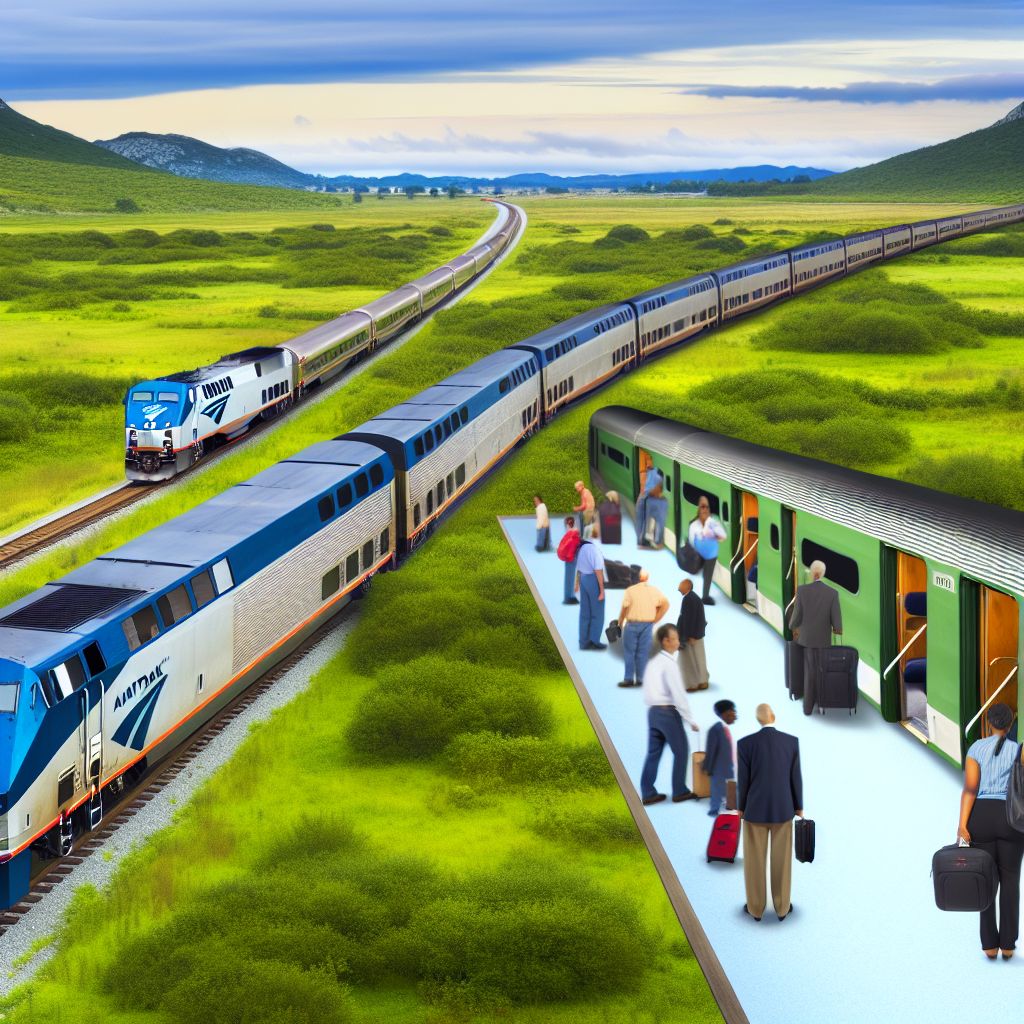Deutsch: Amtrak / Español: Amtrak / Português: Amtrak / Français: Amtrak / Italiano: Amtrak
In the travel context, Amtrak refers to the National Railroad Passenger Corporation, a government-owned corporation that provides intercity passenger train service across the United States. Established in 1971 to take over most of the U.S. passenger rail services previously operated by private railroad companies, Amtrak operates more than 300 trains daily, serving more than 500 destinations in 46 states and three Canadian provinces. Its services range from high-speed rail lines, such as the Northeast Corridor, to long-distance routes that traverse several states, providing an alternative to air and road travel for millions of passengers annually.
Description

Amtrak's mission is to deliver a safe, efficient, and comfortable rail travel experience. It offers a variety of services, including commuter trains, long-distance trains, and high-speed rail services, accommodating the needs of diverse travelers, from daily commuters to tourists exploring the vast landscapes of the United States. Amtrak's rail network facilitates major city connections, offering sleeper services on longer routes, dining services, and the ability to transport vehicles on certain routes.
Application Areas
- Inter-city Travel: Connecting major U.S. cities with efficient rail services.
- Tourism and Sightseeing: Offering scenic routes that provide unique views of the American landscape not accessible by road.
- Business Travel: Providing business class and quiet cars for travelers needing to work while on the move.
- Sustainable Travel Options: Offering a more environmentally friendly alternative to car and air travel by reducing carbon footprint per passenger.
Well-Known Examples
- Northeast Corridor (NEC): The busiest Amtrak route, connecting major cities like Washington D.C., Philadelphia, New York City, and Boston.
- Coast Starlight: A scenic route that travels along the Pacific Coast from Seattle to Los Angeles, offering spectacular views of mountains, forests, and the coastline.
- Empire Builder: Connecting Chicago to either Seattle or Portland through the northern Rockies, it's one of the most scenic long-distance routes in the United States.
Treatment and Risks
While Amtrak provides an essential service, it faces challenges such as funding limitations, aging infrastructure, and competition from air and road travel. Efforts to modernize and expand services, including investments in high-speed trains and infrastructure improvements, are ongoing to address these challenges and meet the growing demand for sustainable travel options.
Similar Terms
- High-Speed Rail: Trains operating at speeds significantly faster than traditional rail traffic, competing with air travel for short to medium distances.
- Commuter Rail: Regional rail services designed to transport passengers between suburban or exurban residential areas and central city business districts.
Summary
Amtrak represents a cornerstone of American intercity travel, providing a wide range of rail services that connect communities, support tourism, and offer sustainable travel options across the United States. With its iconic routes and commitment to service, Amtrak plays a vital role in the national transportation network, offering a unique and environmentally friendly way for travelers to explore the country's diverse landscapes and cities.
--
Related Articles to the term 'Amtrak' | |
| 'Organisation' | ■■■■■■■ |
| Organisation is a deliberate arrangement of people to achieve a particular purpose. . . . Read More | |
| 'Reservation' | ■■■■■■ |
| Reservation is a Guestroom that is being held under an individual or business' name for a specific date . . . Read More | |
| 'Economy' | ■■■■■■ |
| In the travel context, "Economy" typically refers to the most basic and affordable class of service available . . . Read More | |
| 'Eurostar' | ■■■■■■ |
| Eurostar in the travel context refers to a high-speed train service that connects several major cities . . . Read More | |
| 'operator' | ■■■■■■ |
| An Operator is a company providing transportation or Travel related services ( Airline, Cruise line, . . . Read More | |
| 'Tourism Industries' | ■■■■■■ |
| Tourism Industries, US Department of Commerce: The federal Agency responsible for tracking and analyzing . . . Read More | |
| 'Enginehouse' at top500.de | ■■■■■ |
| . . . Read More | |
| 'airport access fee' | ■■■■■ |
| Airport access fee: airport access fee is a fee paid by the car rental companies to the airport Authority, . . . Read More | |
| 'blackout dates' | ■■■■■ |
| Blackout dates: blackout dates is the refers to a date or series of dates on which Travel is NOT available. . . . Read More | |
| 'bulk fare' | ■■■■■ |
| Bulk fare: bulk fare is a fare only available when buying blocks of airline seatsusually lower than published . . . Read More | |
